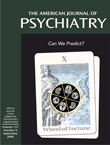Olfactory Deficits in Patients With Mild Cognitive Impairment Predict Alzheimer’s Disease at Follow-Up
Abstract
OBJECTIVE: This study evaluated the predictive utility of olfactory identification deficits in patients with mild cognitive impairment for follow-up diagnosis of probable Alzheimer’s disease. METHOD: Ninety outpatients with mild cognitive impairment were examined at 6-month intervals. Matched healthy comparison subjects (N=45) were examined annually. The University of Pennsylvania Smell Identification Test was given at baseline. RESULTS: Olfaction scores were lower in patients with mild cognitive impairment than in healthy comparison subjects. Seventy-seven patients were followed up; 19 were diagnosed with Alzheimer’s disease by 2 years. Patients with low olfaction scores (≤34 of 40), and patients with low olfaction scores who reported no subjective problems smelling, were more likely to develop Alzheimer’s disease than other patients. In a Cox proportional hazards model adjusted for age, sex, modified Mini-Mental State score, and education, low olfaction scores did not predict time until development of Alzheimer’s disease, but low olfaction scores accompanied by lack of awareness of olfactory deficits predicted time to development of Alzheimer’s disease. This effect remained when attention or memory measures replaced modified Mini-Mental State score in the model. In patients with high Mini-Mental State scores (≥27 of 30), low olfaction with lack of awareness remained a significant predictor of Alzheimer’s disease. Olfaction scores of 30–35 showed moderate to strong sensitivity and specificity for diagnosis of Alzheimer’s disease at follow-up. CONCLUSIONS: In patients with mild cognitive impairment, olfactory identification deficits, particularly with lack of awareness of olfactory deficits, may have clinical utility as an early diagnostic marker for Alzheimer’s disease.



